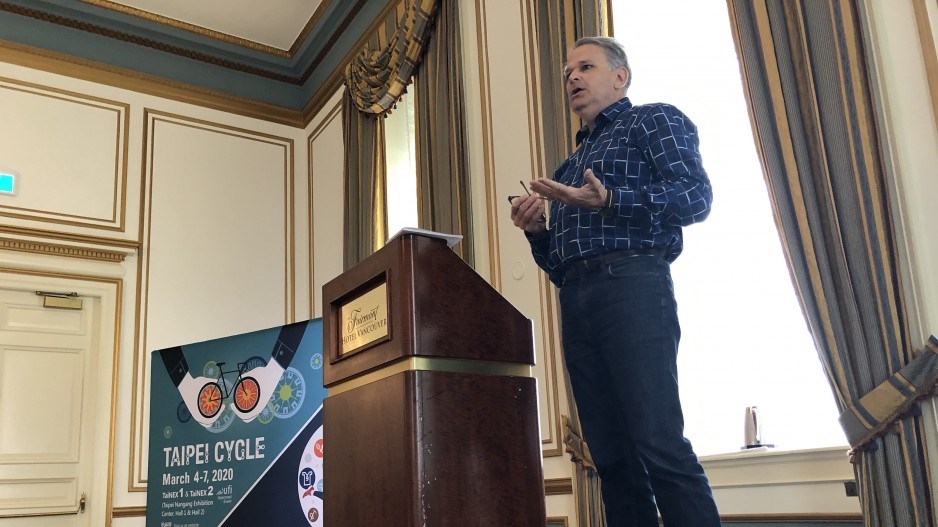One of the world’s largest bicycle makers is targeting Vancouver and the rest of Canada in its quest to expand its exports to North America through the advent of the burgeoning electric bike subsector.
For Taiwan officials promoting the Taipei Cycle show next year in Taipei, choosing Vancouver as one of its focus cities in North America to spread the word about the exhibition is a no-brainer, considering the city’s outdoor profile, health-conscious populace and focus on sustainable urban transit.
“With Vancouver’s exciting and diverse cycling community, as well as its athletic atmosphere, our current business relations encourage [the growth of] a dynamic and ever-developing industry,” said Ruth Chang, director of the Taiwan Trade Center Vancouver, which is a branch of the Taiwan External Trade Development Council (TAITRA).
Canada, like much of the western world, now imports most of its bicycles from two manufacturing markets: Taiwan and China. Last year, Taiwan exported 58,000 units to Canada valued at about US$53 million. Overall, Taiwan is Canada’s 13th largest and B.C.’s sixth largest trade partner.
“Needless to say, Taiwan is the place where bikes are born, and it’s a very important piece of information for our industry to recognize,” said Sarah Lucas, marketing manager of Squamish-based cycling community publication Pinkbike, who has attended the show for years. “Typically, the Taipei Cycle show acts as a kickoff point for our year…. So this gives us an understanding of the market that’s being set for the upcoming 12 months. We can see where the industry is trending.”
But, as it has between Canada and China, trade between Taiwan and China has suffered from political friction.
Beijing regards Taiwan as a renegade province. That has pushed Taipei to seek alternative business partners such as countries in Southeast Asia and to reach deeper into Europe and North America.
Taipei Cycle is the world’s second-largest exhibition of its kind, behind Germany’s Eurobike. While Taiwan enjoys a strong presence in the bicycling industry, the show, which connects manufacturers with wholesalers, suppliers and distributors around the world, has had challenges drawing visitors from North American markets when compared with the numbers for Asia and Europe.
For example, among the 5,614 international visitors to Taipei Cycle 2019, only 9% originated from North America. Asia accounted for 62%; Europe’s portion was 20%.
Canadian presence at the show is 0.2% compared with 4.42% from Germany and 2.38% from Australia. Exhibition organizers hope to push foreign visitor numbers to 8,000 in 2020.
Among the initiatives aimed at raising attendance is an added focus on electric bicycles (e-bikes) and related technology sectors such as the Internet of Things (IOT), which allows consumers to control devices remotely through mobile devices connected to the internet.
TAITRA Vancouver assistant marketing manager Katie Ho said the 2020 show will feature an e-bike section that’s three times larger than the 2019 version, something that was promoted during TAITRA’s Vancouver press conference.
“E-bikes and drive-units are now the future trend in the cycling industry,” Ho said. “… Taiwan is famous for strong industrial clusters in cycling, and we have a lot of experience developing electronic devices. So, in this platform, you will now see the crossover of these two industries.”
That could be a prudent focus. According to sales data consultancy Statista, global sales of e-bikes are expected to reach 50 billion units by the end of 2020. Paul Dragan, owner of Reckless Bikes in Vancouver and a 33-year industry veteran, specializes in urban transportation biking.
He noted the advent of e-bikes, especially in an urban setting like the Lower Mainland, could draw more Canadian mainstream business attention to a show like Taipei Cycle.
“There’s a very large opportunity for micro-mobility throughout the world,” Dragan said. “Our climate is changing; our cities are becoming more populated and more dense. It’s not selling 250 mountain bikes, but selling 10,000 scooters in Vancouver or New York as part of the transit system. It’s certainly a big opportunity.”
Dragan, also a veteran of the Taipei Cycle show, added that regardless of whether a B.C. bike retailer, supplier or distributor is interested in e-bikes, attending an exhibition that’s so close to the manufacturing base of the products being sold provides a valuable opportunity to understand changes in the sector. It also gives entrepreneurs a window on what will be sold on the market in a year or two.
He recalled, for example, that he saw a peculiar metallic folding device that looked like skateboards with handles during his first visit to Taipei Cycle in the late 1990s.
“I thought to myself, ‘These things are strange. Who would buy them?’ The next year, I went to my supplier, and they had some and asked if I was interested in selling them…. I took two and paid $250 per unit up front, and we sold them right away. Then we bought four, and those too sold right away. Then we bought six. Then 10. And I benefited from the fact that I saw these scooters a year before. I knew – while I don’t get why it sells – that it’s selling. So we were selling hundreds of these things in that one year.”
The Razor scooter turned out to be a massive hit, selling more than five million units within six months of its release in 2000.”




